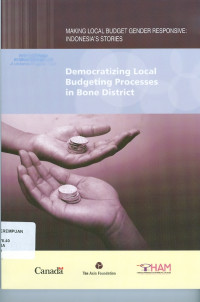
Text
Democratizing local budgeting processes in Bone district
The description below portrays the dynamics behind the success of the advocacy for pro-poor and gender-responsive budgeting in Bone District, to complement the other interesting points put forward in this book, which was written by the LPP Bone activists themselves. The template approach to democratization generally does not work. Assistance to civil society (civic education, advocacy NGOs, media assistance) often disregards power structures—it generally does not assist pro-democracy activists to engage with political parties or challenge power structures. Support to reshape political institutions (electoral aid, political party assistance) is disconnected from the society in which the institutions are rooted—the structures of power, authority, interest, hierarchies, loyalties, patronage and traditions that make up the political weave. Work on civil society takes place in a non-threatening and apolitical language of building trust, establishing pacts, promoting social cohesion and creating spaces. Decentralization can be an agenda of depoliticizing society by divide-and-rule, effectively bypassing interest-based groups such as labor. Policy reforms are the domain of politicians, technocrats and bureaucrats, and the solution to dysfunctional institutions are technical, not political. The results are well-designed technical and administrative policies that are difficult to implement and subject to harsh criticism from civil society. To support democracy, it is not enough to simply open up spaces: there need also to be actions that allow new voices to be heard and give power to people to be involved in governing their communities. Much effort must go into community and political organizing, into building the capacity of civil society to engage government—to repoliticize communities. Local, everyday politics is the foundation for other form of politics. Without grassroots democracy, it is impossible to sustain national democracy (the opposite is also true; if the central government does not protect the right of assembly and expression, it will be difficult to democratize the grassroots). Politics needs to be built from below, because this is where the density of social forces is to be found, where political recruitment and the building of constituencies take place, where people can translate national policies into local programs and local issues into national ideology
Availability
| KP.II-00049 | KP.II ASIA D | My Library | Available |
Detail Information
- Series Title
-
Making Local Budget Gender Responsive: Indonesia's stories series
- Call Number
-
KP.II SUC d
- Publisher
- Jakarta : The Asia Foundation., 2008
- Collation
-
xi, 38 hal. : ilus. ; 30cm.
- Language
-
English
- ISBN/ISSN
-
978-602-8619-05-9
- Classification
-
KP.II
- Content Type
-
-
- Media Type
-
-
- Carrier Type
-
-
- Edition
-
-
- Subject(s)
- Specific Detail Info
-
-
- Statement of Responsibility
-
-
Other version/related
No other version available
File Attachment
Comments
You must be logged in to post a comment
 Computer Science, Information & General Works
Computer Science, Information & General Works  Philosophy & Psychology
Philosophy & Psychology  Religion
Religion  Social Sciences
Social Sciences  Language
Language  Pure Science
Pure Science  Applied Sciences
Applied Sciences  Art & Recreation
Art & Recreation  Literature
Literature  History & Geography
History & Geography